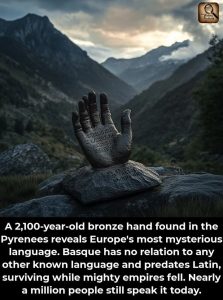The Forgotten Voice of Europe: The Mystery of the Basque Language 🗿✨🌄

The Forgotten Voice of Europe: The Mystery of the Basque Language 🗿✨🌄

Hidden deep within the rugged beauty of the Pyrenees Mountains, archaeologists unearthed a 2,100-year-old bronze hand — an artifact that whispers one of Europe’s greatest linguistic mysteries. 🏺🕰️ Inscribed upon it were words in a tongue older than the Roman Empire, a language that existed before Latin, Greek, or any modern European speech. That language is Basque — the oldest living language in Europe, a survivor of time itself. 🌍💫
Unlike every other European language, Basque stands alone — it has no known relatives. It is not connected to Latin, Germanic, Celtic, or Slavic roots. Its origins remain a puzzle even to modern linguists. 🧩💭 How did it emerge? Who first spoke it? How did it endure through centuries of conquest — from the Romans to the Visigoths, from empires to kingdoms — when so many others vanished into history’s silence? ⚔️🌪️
Yet against all odds, Basque lives on. Nearly a million people in Spain and France still speak it today — the last echo of an ancient Europe that existed long before borders, kings, or empires. 🇪🇸🇫🇷 Its endurance is more than linguistic; it is a symbol of identity, resilience, and the human spirit’s refusal to fade. 🌿🔥
As the bronze hand rises from the mountain soil, it reminds us that some voices never truly die — they simply wait to be heard again. 🖐️🌄
#️⃣ #BasqueLanguage #AncientMystery #EuropeHistory #LostCivilizations #LinguisticHeritage #Archaeology #PyreneesDiscovery #OldestLanguage #CulturalLegacy #HumanResilience #HistoryOfHumanity #BasquePride











